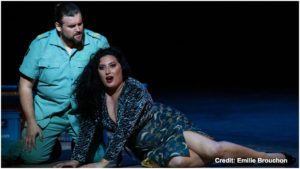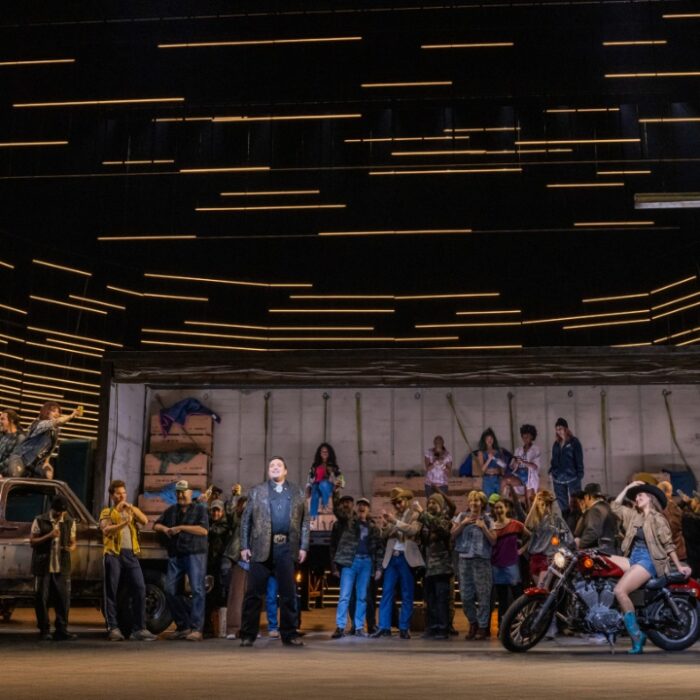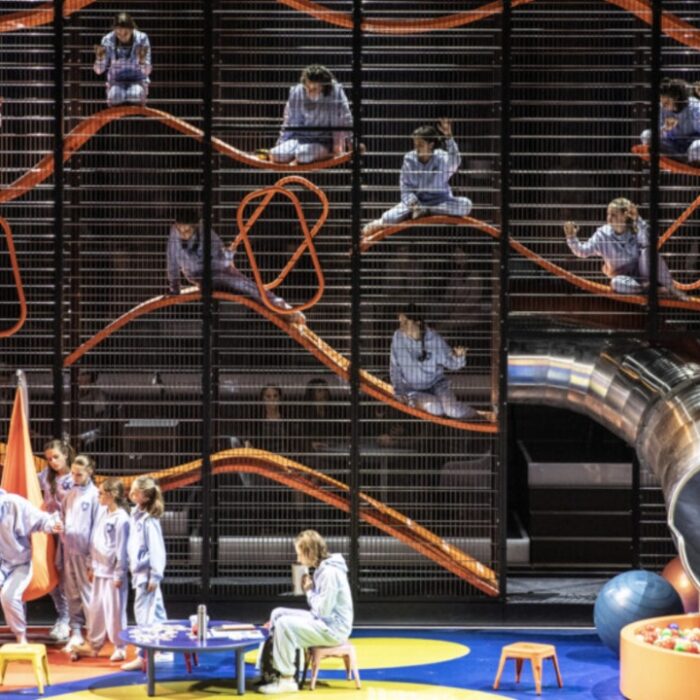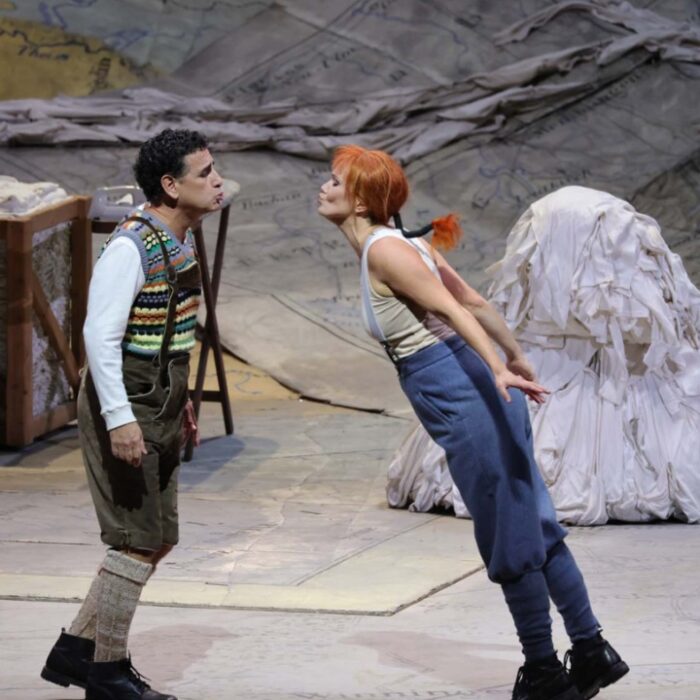
Opéra National de Paris 2018-19 Review: Carmen
Anita Rachvelishvili & Jean-François Borras Shine In Brilliant Calixto Bieto Production
By Mauricio VillaThe Paris Opera revived the Calixto Bieto’s production of “Carmen” at La Bastille with a cast to die for: Anita Rachvelishvili and Roberto Alagna as the tormented couple of Carmen and Don Jose, and Nicole Carr and Roberto Tagliavini as Micaëla and Escamillo. Lorenzo Viotti also made his debut with the company conducting the Orchestre de l’Opéra national de Paris.
Alagna wound up canceling the first two performance due to illness and was replaced by Jean-François Borras, who was scheduled to appear in a few later performances of this run. There was general annoyance from the audience when the Stage Director from the Paris Opera came on stage to make the announcement, but that was a distant memory when they came to applaud Borras at the close of the night.
A Crude, Unromantic World
Calixto Bieto’s conception of “Carmen” premiered at the Perelada Festival in 1999 with Alagna as Don José. It was adapted for the Gran Teatre del Liceu in 2010 but kept the essence of the original production: a vast empty circular space, which could be an allegory of a Bull Ring, where few but effective elements are brought into the scene. Bieito escaped from romantic and exotic ideas, instead setting the opera in a sexist society ruled by men in a unknown frontier village of Spain around 1960. In this world of lascivious soldiers, immigrants, and lower-class criminals, women like Carmen and her friends struggle to survive and live their own way, mostly using their sex appeal, favors, and lies to survive. There are strong cultural connotations like the Spanish flag presiding over the stage during Act one or the telephone booth from which Carmen emerges singing her first lines. We also see the iconic toro de Osborne, which is a recognizable trademark today on many Spanish roads.
Bieito is famous for his crude interpretations full of explicit violence and sex and “Carmen” was no exception. But his approach is justified in this case because these elements play an essential part in developing the action. Bieto always makes the audience uncomfortable. At one point, a soldier in his underwear runs in circles for what seemed like 20 minutes straight throughout Act one; he eventually falls over, exhausted. In another moment, the soldiers throw a girl in the air several times before eventually hanging her from a flagpole at the end of Act one. We see how Le Remendado abuses Carmen and Mercedes, how he and his friends beat Morales to death, even crushing his head with a cardoor several times.We get to see how men use money to buy women and even Don José pays Carmen after their encounter in Lilas Bastia tavern in Act two. Finally, the opera ends with Don José cutting Carmen’s throat in the final scene.
But Bieito also produces lyrical moments too, like the naked torero practicing under the moonlight during the Act four prelude. Ultimately, it is a powerful production that focuses on the crude reality rather than the romantic view of Carmen’s myth. It is not suitable for everybody, but remains an astonishing theatrical experience.
A True Carmen
Anita Rachvelishvili debuted the role of Carmen during the 2009 season of La Scala along Jonas Kaufmann. She was the youngest singer ever to open an opera season at La Scala, and this great achievement, which was televised worldwide, turned her into an overnight star. The young Georgian mezzo-soprano has since presented her Carmen at the major opera houses around the world.
Rachvelishvili is no strange to Bieito’s production and has succeeded in portraying the cynical strong woman who uses her charms and seduction to get what she needs. Her presence, with her expressive dark eyes and long curly hair, dominated the stage from the very first moment she appears in the phone booth. She hypnotized the audience with her sensual Habanera, sung with exquisite taste and expressive dynamics. Her cynicism was shown at her best during the arrest scene and the latter “Près des remparts de Séville,” always sustaining an even vocal line and attacking the high notes effortlessly. She had a blast during the gypsy song, “Les tringles des sistres tintaient,” and exhibited strength and determination during the confrontation with Don Jose at the end of Act two.
Most chilling was the isolation and sense of abandonment she portrayed during the card’s scene, “En vain pour éviter les réponses amères,” where she assumes her destiny of dying at Don Jose’s hands. Finally, there was tremendous fear combined with strength in the opera’s last scene where she fights for her life.
She has a powerful dark voice which circles throughout the vast auditorium of the Bastille with no problem. Her lower register is amazing, especially during her emphasis on “La mort” in Act three. Above all, her registers are perfectly balanced and aligned from the lowest to the highest. Without any doubt we can say that Rachvelishvili is the Carmen of the moment and her interpretation will probably be historical.
A Lyric & Empathetic José
Jean-Francois Borras doesn’t have the spinto or dramatic voice we are used to hearing in Don José. But that didn’t really matter. From a historical perspective, it is essential to remember that “Carmen” premiered at the Opéra Comique, which was a small theatre with a modest orchestra; therefore it would not require a big voice to power through the orchestra in the pit. This is further substantiated by the score itself, with Bizet giving Don José a number of more delicate vocal passages. It’s true that Don Jose is a tough provincial young men, tremendously jealous and with angry outbursts, and often a vibrant dark voice suits the character best from a dramatic standpoint.
But Borras is a very intelligent singer, he uses lyrical beauty without pushing or trying to sound louder. Obviously the first act duet with Micaëla or his aria “Le fleur que tu m’avais jeté,” with a pianissimo high Bb and a breath-taking diminuendo on his last phrase “Je t’aime,” suits this approach far better than Act three and four when the character gets violent. But the final scene was one the best ones I have ever seen; we don’t see an abusive murderer but a suffering and pleading lover who doesn’t want to kill Carmen. Borras made you feel pity for Don José. What’s more, this was undeniably Borras’ choice as my past experiences with this production never espoused this point of view of the character.
A Confident Bass & Resplendent Soprano
It is always a pleasant surprise when a theatre finds a bass and not a baritone or bass-baritone who is able to sing the role of Escamillo. The torreador is a difficult part and baritones might often sound overpowered in some spots, while some basses might lose their edge in the higher tessitura of the role. But, Roberto Tagliavini succeeded, singing and portraying the arrogant torero Escamillo with tremendous poise. He has a powerful bass with ringing and potent high notes; he even reached a high G in his fight with Don José in Act three, even though lower voices usually stay on a lower note. His interpretation of “Votre toast” was impeccable and his impertinence during the fight scene with Don José in Act three (while jumping over cars) was astonishing. He created a tremendously confident Escamillo.
The Australian soprano Nicole Car dazzled in her interpretation of Micaëla. Her lyric, sweet instrument serves Bizet’s music perfectly. In Bieto’s world, she had the challenge of portraying a strong hippie girl from the province rather than the usual naïve and shy girl usually showcased in other productions. For example, she spits on Carmen at the end of Act three when she manages to take Don José away with her to see his dying mother. Her voice blended perfectly with Borras during the duet of Act one, and she showcased all her expressive resources and pure legato during her aria “Je dis que rien ne m’épouvante,” which she coronated with a rotund high B.
The rest of the cast and extras were all excellent in their respective portrayals; the chorus must also be commended. Finally, the orchestra sounded vibrant and alive under the young Viotti, who was inclined to fast tempi and sonorous dynamics, emphasizing the folkloric rhythms of Bizet’s score.
This was an unforgettable night. Go see “Carmen” in Paris if you can.


